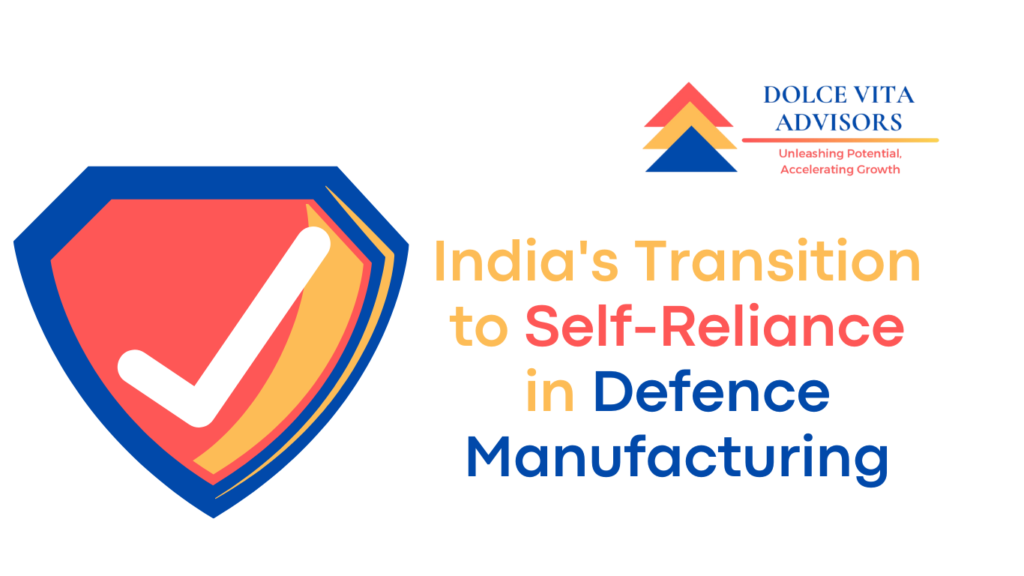
Insights by: Sumit Kochar & Neha Jha
Since gaining independence, India has showcased a rich heritage in manufacturing weaponry. However, a period of stagnation followed, necessitating a paradigm shift towards indigenous defence production. Prime Minister Narendra Modi’s initiation of the “Make in India” initiative in 2014 marked a pivotal moment, heralding a transformative journey towards self-reliance in defence manufacturing.
Policy Reforms and Strategic Initiatives
The inception of the “Atmanirbhar Bharat” campaign has been instrumental in prioritizing domestic procurement and fostering innovation within the defence sector. Noteworthy policy reforms include revisions in the Defence Procurement Policy and the introduction of categories like “Buy Indian – Indigenously Designed, Developed and Manufactured” (IDDM), highlighting the government’s commitment to domestic sourcing. Furthermore, initiatives such as the Defence Acquisition Procedure (DAP) 2020 and the identification of indigenization lists have augmented the domestic defence manufacturing ecosystem, fostering a conducive environment for growth and innovation.
Budgetary Allocations and Infrastructure Development
The unwavering commitment of the Government of India (GoI) towards bolstering domestic defence manufacturing is evident through significant budgetary allocations. In the fiscal year 2023-24, a record 75% of the defence capital procurement budget, approximately Rs. 1 lakh crore, was allocated to the domestic industry. This marked increase from previous fiscal years highlighting the government’s prioritization of indigenous capabilities. Moreover, substantial investments in infrastructure development, exemplified by the establishment of Defence Industrial Corridors in the states of Uttar Pradesh and Tamil Nadu, are poised to stimulate economic growth and catalyze defence manufacturing in these regions, ensuring long-term sustainability and competitiveness.
India’s Emergence as a Defence Exporter
India’s remarkable strides towards self-reliance in defence manufacturing are further evidenced by its emergence as a defence exporter. Hindustan Aeronautics Limited (HAL), a state-owned enterprise, stands as a prime example, engaging in discussions with multiple countries to sell its Tejas light-combat aircraft. Additionally, reports of India selling BrahMos missiles to the Philippines for $375 million signify another significant accomplishment, showcasing India’s growing influence and capabilities on the global stage.
Promotion of Defence Start-ups
The government’s recognition of the pivotal role played by defence start-ups in fostering innovation has spurred the implementation of targeted policy initiatives. Among these, the “Innovations for Defence Excellence” (iDEX) program has emerged as a cornerstone in nurturing a burgeoning ecosystem of defence start-ups in India. Through iDEX, start-ups are empowered to tackle challenges issued by India’s armed forces, thereby contributing significantly to indigenous technological advancements. Additionally, collaborations with incubators across the country provide crucial support to budding entrepreneurs in the defence sector.
Since its inception, iDEX has proven instrumental in aiding numerous start-ups and facilitating the creation of a thriving defence start-up ecosystem in India. Presently, there are over 200 start-ups dedicated to developing innovative solutions for the Indian armed forces. These encompass a wide array of innovations, ranging from advanced imaging capabilities and electro-optical surveillance systems to body armor and medical devices.
Notably, defence start-ups have been particularly effective in supplying the armed forces with unmanned systems. For example, companies such as ideaForge, NewSpace Research & Technologies, and Raphe mPhibr are actively equipping the Indian Army with unmanned aerial vehicles (drones) for surveillance along India’s borders and transportation of supplies in high-altitude areas. Additionally, start-ups like Torus Robotics are pioneering the development of unmanned ground vehicles to assist the army in ferrying heavy loads.
In the maritime domain, companies such as EyeROV are spearheading the production of remotely operated vehicles capable of performing underwater inspections, while Sagar Defence Engineering is engaged in the development of weaponized autonomous unmanned boats for the Indian Navy.
Foreign Direct Investment and Structural Reforms
In alignment with Prime Minister Narendra Modi’s vision, structural reforms within the defence sector have been undertaken to enhance efficiency and bolster indigenous capabilities. The liberalization of foreign direct investment (FDI) policies has encouraged foreign original equipment manufacturers (OEMs) to invest and manufacture in India, thereby strengthening the country’s position in the global defence market. Furthermore, the establishment of new defence companies from the Ordnance Factory Board shows the government’s commitment to streamlining operations and innovation, ensuring a conducive environment for growth and development.
Economic Impact and Global Leadership
The concerted efforts of the GoI have yielded tangible results, with a significant increase in industrial licenses issued for defence manufacturing and a notable decline in arms imports. India’s defence exports have surged to unprecedented levels, reaching over 85 countries and encompassing a diverse range of indigenous defence equipment. This surge in defence exports not only strengthens national security but also contributes to economic growth and job creation. Prime Minister Modi’s steadfast commitment to transforming India’s defence sector has positioned the country as a global leader in defence production, with far-reaching implications for national security and economic prosperity.
Conclusion
India’s journey towards self-reliance in defence manufacturing is characterized by bold policy reforms, strategic initiatives, and substantial investments in infrastructure and innovation. With a concerted focus on domestic procurement, fostering innovation through start-ups, liberalizing FDI policies, and bolstering infrastructure, India is well on its way to achieving its goal of becoming a global leader in defence production. This transformation not only enhances national security but also contributes significantly to economic growth and job creation, ensuring a prosperous and secure future for the nation.

